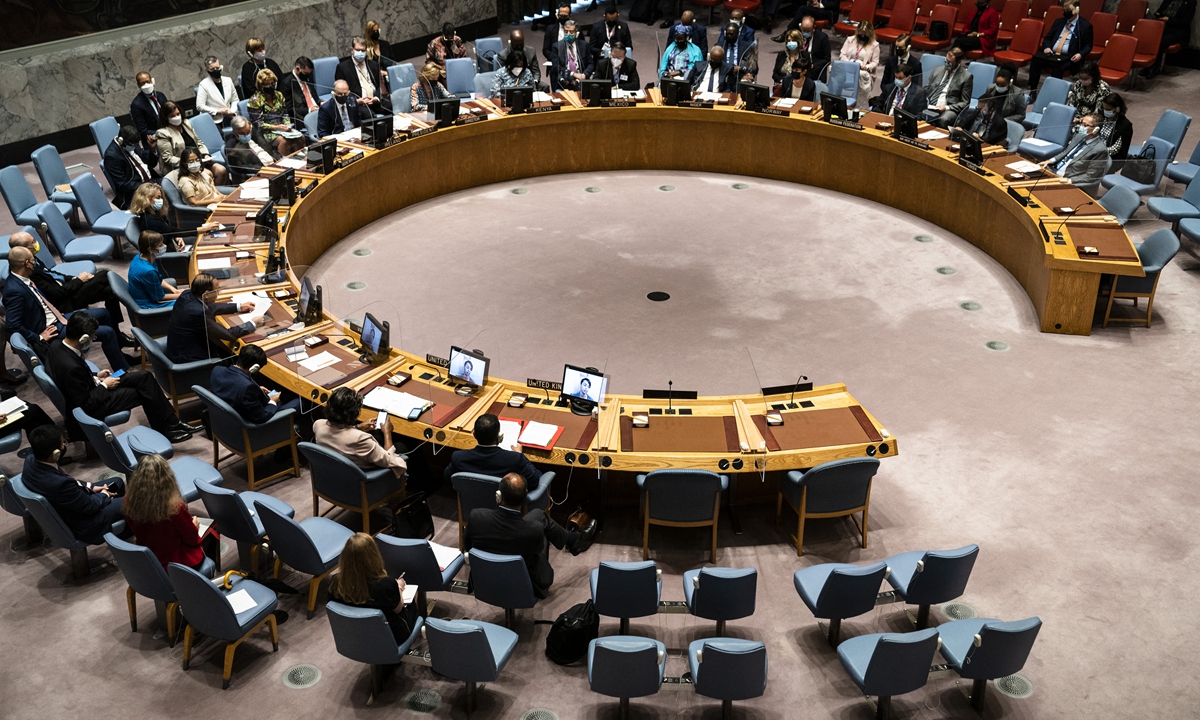
Permanent Representative of China to the United Nations, Zhang Jun, speaks during a meeting of the United Nations Security Council at the 76th UN General Assembly on September 23, 2021 in New York. Photo: AFP
As Russia-Ukraine tensions escalate, the world is paying close attention to China's stance and reaction.
In general, China takes a rather neutral position on the Ukrainian issue and such a position has never changed. Chinese State Councilor and Foreign Minister Wang Yi told US Secretary of State Antony Blinken in a phone conversation on Tuesday that the legitimate security concerns of any country should be respected, and the purposes and principles of the United Nations (UN) Charter should be upheld.
China has been advocating the resolution of differences through dialogue and consultation. The Ukrainian issue is a conflict between Russia and the West as well as between Russia and Ukraine. In other words, these countries are stakeholders.
There are already some multilateral mechanisms for consultation, including the UN Security Council. What China can do now is keep voicing its position at the international level and call on all parties to exercise restraint. China is willing to work actively to settle the conflict, but will only play a mediating role if it has the support and approval of all parties involved.
At the same time, some in the West still question if China will fully support Russia over this issue. Some argue China is standing with Russia, while others try to drive a wedge between the two countries. For example, a recent Wall Street Journal article claims China is actually taking into account its relations with the US when dealing with Russia.
This is a misinterpretation of the logic in China-Russia relations. Beijing and Moscow remain the main driving force for the development of bilateral relations, not other external factors.
China and Russia are good neighbors and share a comprehensive strategic partnership of coordination. The development of relations between the two countries is driven by a series of common interests. This includes maintaining the security of the regional geopolitical environment, as well as promoting peace and development.
As permanent members of the UN Security Council and great powers, China and Russia have to take responsibility while maintaining good bilateral relations. Therefore, both countries are opposed to any wrongdoing or distorted interpretations within the international order.
Smearing China-Russian relations shows the Western diplomacy's inaction toward Russia, or even its failure. For a long time, Russia and the West have been communicating with each other proactively. But the two sides couldn't reach a consensus on many issues. This is because the West decided to treat some of Russia's concerns with indifference, neglect, and even arrogance. It can be said that the West's diplomacy toward Russia has already failed. To help solve the problem, China, as a nation that believes in peace and dialogue, has to continue to oppose the mindset of engaging in a cold war or a zero-sum game.
China supports dialogue, and it advocates the ideal of multilateralism. Neither party can wipe out the other, that peace can only be achieved through co-existence and striving for a win-win solution. This is a healthy and positive attitude.
Spreading false speculation of China's stance on the Ukrainian issue and souring China-Russia relations are not the right way to resolve the crisis.
Discrediting China will not fortify global mutual trust, communication, or unity. This is quite dangerous especially now, as we are on the edge of war and security crises. At this time, all parties should, first of all, engage in dialogue. Throwing mud at China will not defuse the crisis in Ukraine.
It is also unrealistic to undermine relations between Beijing and Moscow. A saying goes, "You can change friends, not neighbors." China and Russia as neighboring countries have to get along, so do Russia and Ukraine.
China-Russia relations are often called "a model of coordination between countries in the 21st century." This indicates that neither China nor Russia thinks only about their own interests when dealing with bilateral and multilateral issues. The two countries are willing to meet each other half way for a win-win situation.
The author is an associate research fellow at the Institute of Russian, Eastern European & Central Asian Studies of the Chinese Academy of Social Sciences. opinion@globaltimes.com.cn




